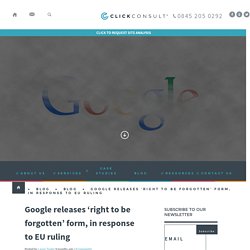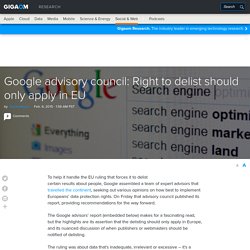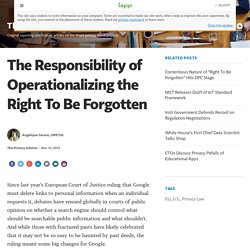

Google Offers 'Right to Be Forgotten' Form in Europe. In response to the European Union’s “right to be forgotten” ruling, which we posted about last month, Google has launched a form, which allows individuals to apply for inadequate or irrelevant information about them to be extricated from search results pages.

This is a step that Google has taken reluctantly, admitting last month that the ruling was “disappointing” and that it needs time to “analyse the implications” of the new law. And Google is not alone in its skepticism; critics of the European Court ruling say that it could limit free speech, protect criminals from being named and shamed and retain information that is in the public’s interest. Report of the Advisory Committee to Google on the Right to Be Forgotten.
Google advisory council: Right to delist should only apply in EU. To help it handle the EU ruling that forces it to delist certain results about people, Google assembled a team of expert advisors that travelled the continent, seeking out various opinions on how best to implement Europeans’ data protection rights.

On Friday that advisory council published its report, providing recommendations for the way forward. The Google advisors’ report (embedded below) makes for a fascinating read, but the highlights are its assertion that the delisting should only apply in Europe, and its nuanced discussion of when publishers or webmasters should be notified of delisting. The ruling was about data that’s inadequate, irrelevant or excessive – it’s a fundamental right in Europe that people can have such data deleted, and the Court of Justice of the European Union decided last year that this data protection right can be applied to search engines. The global question Overall, though, the council said delisting should only apply in Europe. It continued: Notifications. Europe: Right to be Forgotten – Google Advisory Council published its report. Google risks legal action over ‘right to be forgotten’ report.
Google spells out how to be 'forgotten' in search - May. 30, 2014. LONDON (CNNMoney) The new form has been made available to people in 28 European Union countries and four neighboring nations after the European Union's top court ruled that people have the "right to be forgotten.

" The ruling means that search engines like Google (GOOGL) must remove certain unwanted links from search results if requested. "We will assess each individual request and attempt to balance the privacy rights of the individual with the public's right to know and distribute information," Google says on the form. A Google spokesperson said the form could be used by Europeans, expats living in Europe and people living abroad who have strong ties to the continent, such as family and business connections. People in Iceland, Liechtenstein, Norway and Switzerland can also apply, even though they're not technically part of the European Union. Those living outside Europe can make requests using a different form, but Google is not legally obligated to take action or make changes.
Droit l’oubli : Google débordé face à des centaines de demandes en Grande-Bretagne. 01net le 16/05/14 à 17h57.

Net.wars: Memory hole. Some years ago, a long-time member of the WELL became the CEO of a public company.

He promptly, to some amusement among those with functioning memories and archived conference topics, deleted his old postings, particularly the ones that might be embarrassing if unexpectedly exported to a newspaper or the Web. He could do this because although the WELL's original design did not include the ability to delete posts, its interface was open enough that an early user had written one and made it available to the community at large. What Google Must Forget: The EU Ruling on the Right to Be Forgotten. The Responsibility of Operationalizing the Right To Be Forgotten. Since last year's European Court of Justice ruling that Google must delete links to personal information when an individual requests it, debates have ensued globally in courts of public opinion on whether a search engine should control what should be searchable public information and what shouldn't.

And while those with fractured pasts have likely celebrated that it may not be so easy to be haunted by past deeds, the ruling meant some big changes for Google. But at last week's Global Privacy Summit in Washington, DC, William Malcolm, Google's senior privacy counsel and a member of the IAPP European Advisory Board, said the company didn't flinch once the decision came down. 'There's no doubt this ruling is a landmark ruling, and right from the start, Google made it clear that although we disagreed, we respected it," he said.
Google et le droit à l'oubli. L’arrêt rendu par la Cour de Justice de l’Union Européenne le 13 mai 2014 se prononce de façon claire pour l’application à la société Google Inc. de la directive D 95/46/CE relative à la protection des personnes physiques à l’égard du traitement des données à caractère personnel et à la libre circulation de ces données.

La Cour apporte ainsi une réponse définitive à une question discutée en France mais également dans d’autres pays de l’Union et notamment l’Espagne, sous l’impulsion de qui l’arrêt est intervenu. L’affaire est née d’un conflit entre les sociétés Google Inc., Google Spain et un particulier espagnol, lequel avait déposé plainte auprès de l’AEPD (Agence Espagnole de Protection des Données). Google right to be forgotten 'draconian': Berners-Lee. Tim Berners-Lee, the man who invented the World Wide Web in 1989 while working at the Swiss particle laboratory CERN, said the world has a "problem with data disappearing" and the right to be forgotten ruling would make it worse.

Comment Google traite-t-il les demandes de droit à l'oubli ? - FrenchWeb.frFrenchWeb.fr. Entériné en mai dernier par un arrêt de la Cour européenne de justice, le droit à l’oubli est censé permettre à une entreprise de « déréférençer » les informations qui entrave sa e-reputation.

Le procédé paraît simple, puisqu’il suffit de remplir un formulaire pour demander à Google de retirer les informations gênantes. Mais la réalité est évidemment plus complexe. L’agence Reputation VIP, qui a lancé en juin dernier un site baptisé Forget.me, gère les demandes de suppression des recherches sur Google et Bing. Le service comptabiliserait 21 000 inscriptions à ce jour. L’éditeur publie les résultats d’une étude sur les traitements des formulaires Google sur les demandes de suppression d’informations, dans 30 pays européens.
Les tableaux ci-dessous indiquent la répartition des réponses favorables et non favorables des suppressions demandées: Répartition par type de réponse Répartition des « Non » par type de refus. Just Google it? Forget it! The right to be forgotten case. The Protection of Personal Information Act, No 4 of 2013 (POPI) was promulgated into law on 26 November 2013 and will commence on a date to be determined by the President by proclamation.

As of 11 April 2014, certain provisions of POPI dealing with the establishment of the office of the Information Regulator as well as the powers, duties and functions of the Information Regulator have come into effect. Although the full extent of its application in South African law and how our courts will interpret its provisions remains uncertain, it is likely that we will need to look to foreign jurisdictions for guidance in the future. In summary, the complainant in the matter had launched a complaint with the Spanish Data Protection Agency (AEPD) against a widely circulated daily Spanish newspaper, Google Spain and Google Inc. (Google). In July 2010, the AEPD dismissed the complaint against the newspaper on the grounds that such information was lawfully published.
Nick Altini Competition Aadil Patel. The World Intermediary Liability Map (WILMap) is Online! The WILMap is a detailed English-language resource comprised of case law, statutes, and proposed laws related to intermediary liability worldwide. The WILMap allows visitors to the CIS website to select information on countries of interest through a graphical user interface. The map will enable the public to learn about intermediary liability regimes worldwide and evolving Internet regulation affecting freedom of expression and user rights. Legal liability regimes that put Internet platform companies at legal risk for users’ online activity can imperil free expression and innovation.
By their nature, Internet services are inherently global, but Internet companies face a real challenge understanding how those global regimes might regulate the services they offer to the public. This uncertainty can hurt users by potentially scaring companies away from providing innovative new services in certain markets. Google details troubles it and others face meeting right to be forgotten requests. Google has outlined the complexities and costs it faces when handling European 'right to be forgotten' requests, throwing a spotlight on the difficulties smaller rivals may face with the process.
The last thing Google wanted when the EC proposed including a 'right to be forgotten' in data protection legislation back in 2012 was for such a law to apply to search engines. Publishers, yes; hosting platforms, not really; search engines definitely not, appeared to be its stance. Now, thanks to a ruling by the European Court of Justice handed down in May, Google is having to contend with the introduction of just such a right. The court's decision stipulated that European citizens can ask search engines to remove particular links from results returned for a search on their name, if the material is deemed to be out of date, no longer relevant, or excessive. Protection of personal data - Justice. Whenever you open a bank account, join a social networking website or book a flight online, you hand over vital personal information such as your name, address, and credit card number.
What happens to this data? Could it fall into the wrong hands? What rights do you have regarding your personal information? Under EU law, personal data can only be gathered legally under strict conditions, for a legitimate purpose. Furthermore, persons or organisations which collect and manage your personal information must protect it from misuse and must respect certain rights of the data owners which are guaranteed by EU law. Every day within the EU, businesses, public authorities and individuals transfer vast amounts of personal data across borders. Therefore, common EU rules have been established to ensure that your personal data enjoys a high standard of protection everywhere in the EU. 5 more things we've learned about the right to be forgotten. Social by Jimmy Nicholls| 04 August 2014.
Google shall forget your personal data!